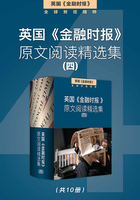
Self-driving taxis hit the road in Singapore(593 words)
By Jeevan Vasagar in Singapore
Singapore has claimed a head-start in the global race to deploy self-driving cars with the launch on Thursday of the world's first public trial of a robo-taxi service.
The trial allows selected members of the public to use a smartphone app to hail a free ride in autonomous cars operated by nuTonomy, a US startup that has been conducting trials of self-driving vehicles in Singapore since April.
The passengers, travelling either in a specially configured Renault Zoe or Mitsubishi i-MiEV electric vehicle, will be accompanied by one of the company's engineers, who can take control of the vehicle if necessary.
The trial steals a march on Uber, which is expected to begin testing an autonomous taxi fleet with customers in the US city of Pittsburgh within weeks.
Uber and pioneers of the autonomous car industry including Google, Tesla and Volvo are already road-testing self-driving vehicles with varying success, but nuTonomy says it is the first to offer rides to members of the public in a real-world setting.
The experiment is being conducted on a 6km network of streets in the One North area of Singapore, home to a number of science-focused companies and government research institutes. The trial, involving a fleet of six cars, will be conducted in normal traffic and includes both light and heavy traffic routes.
The pilot is being used to gather data on the performance of nuTonomy's self-driving software, routing efficiency, and the vehicle booking process ahead of the launch of a commercial robo-taxi service in Singapore, scheduled for 2018.
Karl Iagnemma, co-founder of nuTonomy, said in a statement: “The trial represents an extraordinary opportunity to collect feedback from riders in a real-world setting, and this feedback will give nuTonomy a unique advantage as we work toward deployment of a self-driving vehicle fleet in 2018.”
The Cambridge, Massachusetts-based startup is a minnow in the robotics car race, which has been dominated by big technology groups and car companies such as Google and Ford. It was founded in 2013 by two MIT researchers, Mr Iagnemma and Emilio Frazzoli, who specialise in mobile robotics.
In May, nuTonomy completed a $16m Series A funding round led by Highland Capital Partners, with investors including the corporate investment arm of Singapore's Economic Development Board.
The company is also testing self-driving cars in the US and UK, where it collaborates with Jaguar Land Rover.
Singapore's government is keen to foster technology startups as it seeks new sources of economic growth. Using shared self-driving pods to shuttle commuters from their doorsteps to public transport is also seen as a way to curb private car usage on a densely populated island.
The ministry of transport has “invited companies and research institutions who are at the forefront of this development to test-bed their self-driving technology and mobility concepts here, in real-life, mixed-use traffic conditions,” it said in a statement. “We see this as a prelude to the eventual roll-out of their self-driving transport solutions in Singapore.”
Last week Uber announced a partnership with Volvo in which the two companies will jointly invest $300m to develop a self-driving vehicle. Uber has also bought Otto, a maker of self-driving technology for trucks.
请根据你所读到的文章内容,完成以下自测题目:
1.Which is not the pioneer of the autonomous car industry?
A.Google
B.Mercedes Benz
C.Tesla
D.Volvo
答案
2.Which is not right about the experiment in the One North area of Singapore?
A.conducting in complex traffic
B.a 6km network of streets
C.home to a number of science-focused companies
D.involving a fleet of six cars
答案
3.When will the launch of commercial robo-taxi service in Singapore be scheduled?
A.2016
B.2020
C.2018
D.2028
答案
4.How much did the investors invest in nuTonomy?
A.$10m
B.$16m
C.$18m
D.$30m
答案